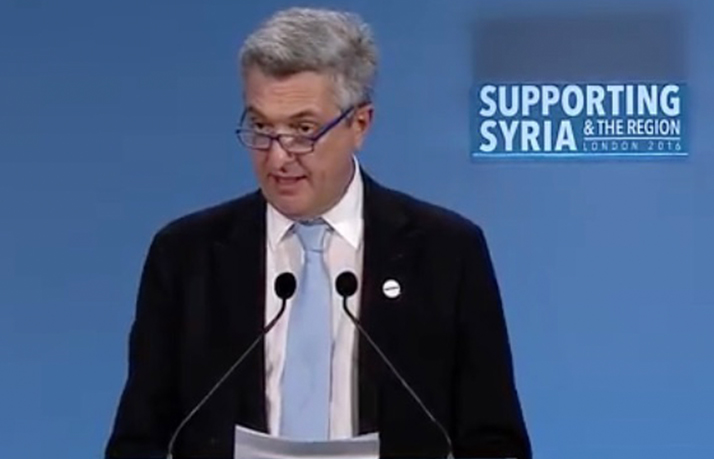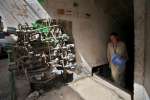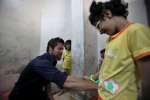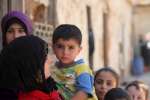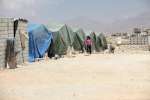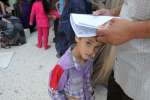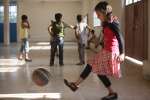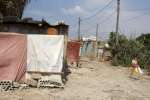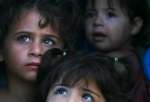- Text size
 |
|  |
|  |
| 
- عربي
Donors pledge more than US$6 billion for Syrians
News Stories, 4 February 2016
LONDON, United Kingdom, Feb 4 (UNHCR) – Donor and host countries raised today more than US$6 billion and pledged continued support, protection and opportunities for more than 22.5 million people in need of humanitarian assistance both inside Syria and across the region in 2016. In addition, over US$5 billion has been pledged for humanitarian and development programmes until 2020.
Co-hosted by the United Kingdom, Germany, Norway, Kuwait and the UN, the pledging conference mobilised important new and record funding for humanitarian and development needs for Syrians and neighbouring communities hosting them since 2011. Five years of brutal war in Syria have forced half of the Syrian population out of their homes, with over 4.5 million becoming refugees, most in Turkey, Lebanon, Jordan, Iraq and Egypt.
Although focusing on humanitarian needs across the region, the two-day conference in London loudly underscored the urgency of ending the Syrian conflict and finding a political solution.
In his opening remarks, UN Secretary General Ban Ki Moon encouraged a change in the narrative around the Syrian crisis. "With our solidarity and generosity, we can bring true hope to the people of Syria," he said. The Secretary General also stressed the need for a change of approach and multi-year commitments.
European countries made particularly strong pledges to support Syrians and their neighbours. German Chancellor Angela Merkel said it was important "to show that this can be a day of hope" as her government pledged US$1.3 billion in 2016 alone – the largest pledge of the conference – and announced a similar aid package for 2017, aimed at supporting food, shelter, education, investments and job creation for Syrian refugees and the communities hosting them.
Echoing Merkel's sentiments and announcing a US$278 million aid package in 2016, the Norwegian Prime Minister Erna Solberg urged particular attention to the needs of Syrian women and girls.
The UK Prime Minister David Cameron stressed that it was a moment to take visionary new approaches to ease the suffering of Syrian people and create opportunities, investments and jobs for Syrian refugees and their hosts, adding that the UK was doubling its 2016 aid contribution to more than US$730 million in order to address the immediate humanitarian and development needs.
Other important pledges include the one by the President of the European Council, Donald Tusk, who promised US$1.2 billion on behalf of the EU for 2016 needs and another US$1.39 in multi-year commitment.
The United States of America, represented by the Secretary of State, John Kerry, also nearly doubled its contribution from last year and pledged US$925 million.
Kuwait, a steady financial supporter of humanitarian needs in the region and the host of the three previous pledging conferences for Syria, again contributed generously by pledging US$100 million for 2016 and another US$200 million in multi-year support. UAE and Saudi Arabia pledged US$137 million and US$200 million respectively.
Leaders of Jordan, Lebanon and Turkey – King Abdullah II, Prime Ministers Tammam Salam and Ahmet Davutoglu – spoke passionately about the suffering of more than 4.5 million Syrian refugees in their countries and the humanitarian, economic and social challenges their countries have endured over the past five years.
Concerned about the impact of the conflict in neighbouring Syria, and the safety and wellbeing of both their citizens and Syrian refugees in their countries, they urged prompt implementation of the pledges. They also stressed the sensitivities of the shift from handouts for Syrian refugees to their self-reliance through education, investments and job creation, which equally must improve and advance the livelihoods of the communities which accepted such unprecedented numbers of refugees.
Speaking at the London Syria Conference, UN Refugee Agency chief Filippo Grandi called for a significant increase in funding pledges to aid Syrian refugees, who are becoming more vulnerable as the Syrian war drags on.
Thanking donors who provided more than US$7 billion since 2012 in successive conferences, Grandi stressed that a "significant increase in pledges is needed to offer much-needed stability, opportunities and hope" to refugees and the countries hosting them, at least 10 per cent of whom are estimated to be particularly vulnerable.
"We want to ensure that refugee rights are upheld everywhere and that they have access to shelter, food and healthcare. This must continue. But we also want to create opportunities for education and livelihoods. This is what refugees want desperately," Grandi told world leaders attending the conference.
"Funding gaps in the past have meant gaps in our ability to respond. They have left too many host communities overwhelmed. Too many refugees in desperate need have fallen through the cracks and, as we speak, many are moving to the shores of Europe," he added.
Calling the conference "visionary," Grandi said it would also prepare refugees for their eventual return to Syria, which he said was of "crucial importance."
"The parties to the conflict have so far over and over again eluded their responsibility to stop the war. This is tragic. While efforts to bring peace continue, we must not fail in our responsibility to help and protect the victims. Today we have that opportunity."
UNHCR is organizing a high level meeting on resettlement and other legal pathways for Syrian refugees in Geneva on March 30. Grandi invited all governments present at the London conference to support that event.
Wrapping up the two day event the UN Secretary General called the conference a "great success."
"Never has the UN raised so much in a single day for a single cause," said the Secretary General, thanking all participants, in particular the countries sheltering Syrian refugees and the co-hosts of the conference.
By Andrej Mahecic in London, United Kingdom
